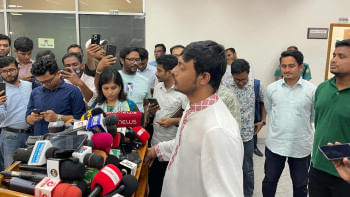Rohingyas face forced starvation
Myanmar security forces continue the ethnic cleansing of the Rohingyas in Rakhine, Amnesty International says in a new report.
The report was prepared on the ongoing forced starvation, looting and sexual violence, which coerced hundreds of people to flee in the recent weeks.
Nineteen Rohingya men and women, who have arrived in Cox's Bazar recently, described how they faced forced starvation, abductions and looting of property in their home in recent weeks when humanitarian agencies too have documented thousands of new arrivals over the course of December and January.
Nearly 700,000 Rohingyas fled the atrocities since August 25 last year after the Arakan Rohingya Salvation Army reportedly attacked around 30 security force outposts in Rakhine, where the Rohingyas have been denied citizenship and other basic rights though they have been living there for generations.
The crimes committed by the military include widespread killing of women, men, and children; rape and other forms of sexual violence against women and girls; mass deportation; and the systematic burning of villages.
Facing sharp global criticism, Myanmar signed a repatriation deal with Bangladesh and were preparing for return of the Rohingyas, but the UN and rights bodies say the situation in Rakhine is not conducive at all for a safe, voluntary and dignified return.
“Shielded by official denials and lies, and a concerted effort to deny access to independent investigators, Myanmar's military continues to get away with crimes against humanity,” said Matthew Wells, senior crisis advisor at the Amnesty International.
The ongoing oppression appears to be designed to make northern Rakhine State unlivable for the tens of thousands of Rohingyas still there, said AI.
“Without more effective international action, this ethnic cleansing campaign will continue its disastrous march,” said Matthew Wells.
FORCED STARVATION
The Rohingyas, who had stayed in Myanmar throughout violence to protect their property and safeguard their right to live in their villages, were forced by the military's persistent persecution to finally break their resolve and join the exodus to Bangladesh, says the AI.
Many new Rohingya arrivals said the military denied them access to their rice fields at harvest time, in November and December. Myanmar security forces have also participated in, or facilitated, the theft of Rohingya livestock and have burned several local markets.
ABDUCTIONS OF GIRLS AND WOMEN
The AI documented three recent incidents of the Myanmar military abducting girls or young women.
In early January, soldiers forced their way into a house in Hpoe Khaung Chaung village, Buthidaung Township. As the soldiers searched the house, Hasina, 25, said they demanded at gunpoint that her uncle hand over her 15-year-old cousin, Samuda. The family has not seen the girl again.
SEXUAL VIOLENCE
Rohingya women, particularly young women, attempting to flee told AI that Myanmar soldiers subjected them to sexual violence during searches at checkpoints.
Khateza, 22, arrived at a checkpoint near Sein Hnyin Pyar on around January 25. After searching the men from head to toe and robbing them, the security forces searched the women.
“They searched our bodies. They took off our [outer] clothes. All the young women, including me… they searched us like this -- they put their hand inside [on our breasts]… I was really uncomfortable. It was so embarrassing. I was crying,” she said.
SYSTEMATIC THEFT FROM FLEEING ROHINGYA
When groups of Rohingya families arrive at the check points after walking for days, Myanmar soldiers and Border Guard Police descend from a security force outpost on a hillside and surround them, separating men from women. The security members then systematically rob the Rohingya of valuables.
After robbing them, the security forces took down their names and the villages they were from. At later checkpoints, in Maungdaw Township, some new arrivals also described being photographed and, in a few cases, recorded on a video camera saying the military had not mistreated them.
INTERNATIONAL RESPONSE 'WEAK AND INEFFECTIVE'
“Since the beginning of the crisis, the international community's response to the atrocities against the Rohingya population has been weak and ineffective, failing to grasp the severity of the situation in northern Rakhine State or put sufficient pressure on Myanmar's military to stop the ethnic cleansing,” said Matthew Wells.
He said an arms embargo and targeted sanctions are urgently needed to send a message that these violations will not be tolerated.
“There is also an urgent need for unfettered and sustained humanitarian access throughout northern Rakhine State.”
EIGHT COUNTRIES PUSH UN
Meanwhile, Britain, France, the United States and five other countries yesterday asked the UN Security Council to discuss the fate of hundreds of thousands of Rohingya refugees driven from Myanmar, diplomats said.
The council will hold a meeting on Tuesday to hear UN High Commissioner for Refugees Filippo Grandi's report on the crisis, reports AFP.

 For all latest news, follow The Daily Star's Google News channel.
For all latest news, follow The Daily Star's Google News channel. 



Comments